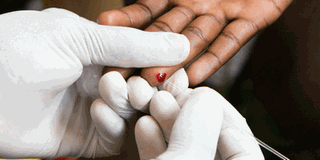Let’s go back to basics and fight HIV/Aids

Several people are quite hesitant towards testing for HIV/AIDS with some attributing that to high testing costs especially in poorer countries across the globe. PHOTO/COURTESY
A joint United Nations Programme on HIV/Aids (Unaids) report, titled ‘In Danger’, has revealed glaring gaps in the fight against the HIV pandemic and warned that millions of lives are at risk as progress falters.
In Uganda and other struggling countries in eastern and southern Africa, where leaders had reduced new HIV infections and deaths, the 2021 Unaids report now says the successes have ominously slackened.
In the last two years of the Covid-19 pandemic and the impact of other global calamities, progress in the war against Aids has vacillated at an alarming rate. This revelation, however, calls for concerted efforts in the fight against the scourge. Let’s design a strategy that focuses on accelerating treatment coverage and impermeable prevention campaigns.
For many years, other countries (big and small), widely regarded Uganda as an HIV/Aids success story. We must, as a matter of urgency, investigate how we have ended up with 20,000 young people aged 15-24, contracting HIV last year. What is more disturbing is the fact that of these, 15,000 were girls.
The report further shows that Uganda registered 54,000 new HIV infections in 2021. However, records at Uganda Aids Commission (UAC) indicate that the country registered a total of 38,000 new HIV infections in 2020, which is 28 per cent lower than 53,000 infections recorded in 2019. New HIV infections in Uganda had stagnated at 53,000 in 2018 and 2019, according to previous data from the Aids commission.
Unaids country director Jacqueline Makokha has advised authorities in Uganda to refocus and reiterated that progress towards ending the HIV/Aids pandemic by 2030 has slowed down. As we restrategise to deal with the HIV menace, it’s important that government, as well as the private sector players join forces and face the enemy head-on.
To reverse the current situation, we must quickly discover where we went wrong and at what point an incontrovertible fight that had won hearts and minds across the globe took a wrong turn.
Uganda’s success story had become virtually synonymous with the government ABC strategy – an overarching HIV/Aids prevention programme, for Abstain, Be faithful (monogamy), use Condoms. This strategy, alongside well-targeted messages became the magic bullet that forced prevalence of HIV to decline.
The ABC strategy was deliberately set up to alert the general public about the dangers of HIV. However, as infections continue to rise among the married and unmarried, we need to encourage people to test for HIV and reinforce what had worked with other new precautionary measures.
We, therefore, propose a well-financed “hybrid approach” that reinforces ABC with other strategies critical in preventing transmission of HIV from mothers to their children, safe male medical circumcision and inspire the young people to resist temptations and navigate real-life situations safely.




